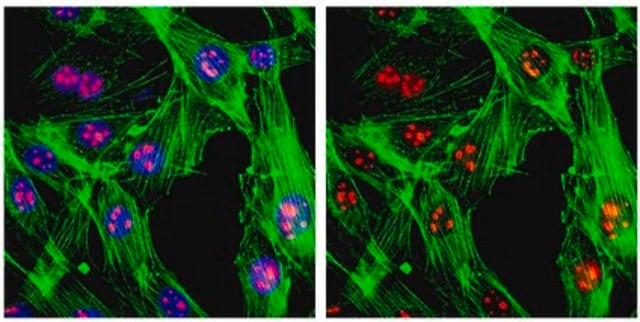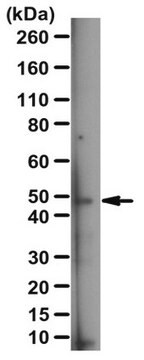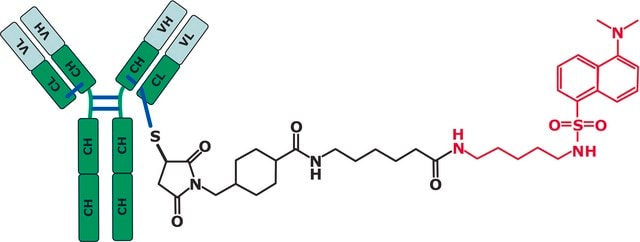AB2215
Anti-Interferon-β Antibody
serum, Chemicon®
Sinonimo/i:
Anti-IFB, Anti-IFF, Anti-IFN-beta, Anti-IFNB
About This Item
Prodotti consigliati
Origine biologica
rabbit
Livello qualitativo
Forma dell’anticorpo
serum
Tipo di anticorpo
primary antibodies
Clone
polyclonal
Reattività contro le specie
mouse
Produttore/marchio commerciale
Chemicon®
tecniche
ELISA: suitable
immunohistochemistry: suitable
immunoprecipitation (IP): suitable
neutralization: suitable
western blot: suitable
N° accesso NCBI
N° accesso UniProt
Condizioni di spedizione
dry ice
modifica post-traduzionali bersaglio
unmodified
Informazioni sul gene
mouse ... Ifnb1(15977)
Specificità
Immunogeno
Applicazioni
Western blot (1:500) The antibody reacts with a 19kDa band coresponding to Mu-IFN-beta. Protocol below:
1. Put protein (approx 50ng) in blocking solution for 30-60 min RT
2. Add Primary antibody (1:500) to blocking solution
3. Agitate membrane for 60 min, RT
4. Wash 3X for 5min each with PBS-Tween
5. Add secondary antibody (1:1000) after diluting in PBS-Tween
6. Gentle agitation for 60min.
7. Wash 3X for 5min each with PBS-Tween
8. Develop with reaction kit of choice
Immunoprecipitation
Immunohistochemistry
ELISA
Optimal working dilutions must be determined by end user.
Inflammation & Immunology
Cytokines & Cytokine Receptors
Confezionamento
Stato fisico
Stoccaggio e stabilità
Note legali
Esclusione di responsabilità
Not finding the right product?
Try our Motore di ricerca dei prodotti.
Codice della classe di stoccaggio
10 - Combustible liquids
Classe di pericolosità dell'acqua (WGK)
WGK 1
Punto d’infiammabilità (°F)
Not applicable
Punto d’infiammabilità (°C)
Not applicable
Certificati d'analisi (COA)
Cerca il Certificati d'analisi (COA) digitando il numero di lotto/batch corrispondente. I numeri di lotto o di batch sono stampati sull'etichetta dei prodotti dopo la parola ‘Lotto’ o ‘Batch’.
Possiedi già questo prodotto?
I documenti relativi ai prodotti acquistati recentemente sono disponibili nell’Archivio dei documenti.
Il team dei nostri ricercatori vanta grande esperienza in tutte le aree della ricerca quali Life Science, scienza dei materiali, sintesi chimica, cromatografia, discipline analitiche, ecc..
Contatta l'Assistenza Tecnica.







